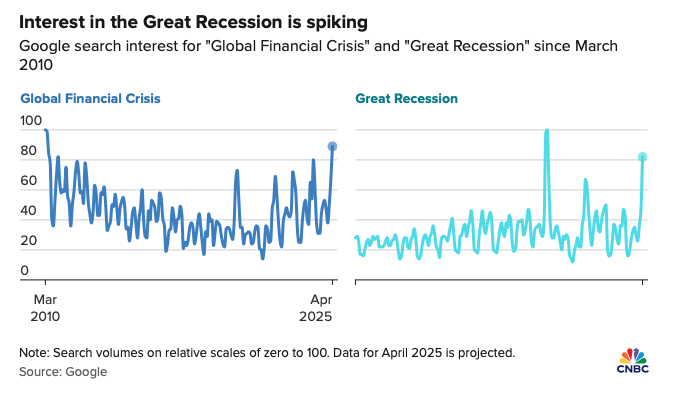Author Archive for JOHN ADAMS
Art, Daily Bread, Language
Daily Bread for 4.27.25: Why Do We Call the Mona Lisa the Mona Lisa?
by JOHN ADAMS •
Good morning.

Sunday in Whitewater will be sunny with a high of 67. Sunrise is 5:54 and sunset is 7:51, for 13 hours, 57 minutes of daytime. The moon is new with 0.1 percent of its visible disk illuminated.
On this day in 1945, Benito Mussolini is arrested by Italian partisans in Dongo, while attempting escape disguised as a German soldier.
Sophia Smith Galer on why we call the Mona Lisa the Mona Lisa:
The Most Unusual Churches in the World:
America, Babbittry, Boosterism, City, Daily Bread, Economics, Economy, Special Interests, That Which Paved the Way, Trumpism, Willful Ignorance, Wisconsin
Daily Bread for 4.26.25: Consumer Sentiment Falls, and Web Searches for Economic Calamity Rise
by JOHN ADAMS •
Good morning.

Saturday in Whitewater will be sunny with a high of 59. Sunrise is 5:55 and sunset is 7:50, for 13 hours, 54 minutes of daytime. The moon is a waning crescent with 2.2 percent of its visible disk illuminated.
On this day in 1954, the first clinical trials of Jonas Salk‘s polio vaccine begin in Fairfax County, Virginia.
Two charts tell the tale of Americans’ economic concerns:
See Alex Harring, Americans are getting flashbacks to 2008 as tariffs stoke recession fears, CNBC, April 26, 2025.
When sentiment declines, it’s understandable that Americans would look for examples of other difficult times.
For modern Whitewater, the Great Recession’s influence is the key to understanding both economics and politics in the city. It is Whitewater’s signal modern event. Those difficult years from 2007-2009 led to an aftermath that still afflicts the city.
The failure of local officials and community leaders during that time was astonishing: the boosters1 wanted to deflect past others’ suffering, the special-interest men diverted valuable resources to their own schemes while Whitewater stayed poor2, the center-left grew but still struggles to land a decisive blow3, and the rightwing populists4 now in the city owe their present role as a faction to forces they can’t or won’t grasp.
_____
- Narrow of mind and small of heart. See the FREE WHITEWATER category on Boosterism. ↩︎
- Avaricious schemers failing time and again to match the accomplishments of the generation before them. See the FREE WHITEWATER category on Special Interests. ↩︎
- It does no good to talk to a hyena in a soft voice hoping that the vile creature will give up meat for vegetables. See Wisconsin Senate Democrats Hope Hyenas Will Stop Eating Meat. ↩︎
- An authoritarian populist movement of recrimination and revenge. See Defining Populism. ↩︎
Hubble views of Mars and more for space telecope’s 35th anniversary:
Authoritarianism, Daily Bread, Education, Trumpism, UW Madison, Wisconsin
Daily Bread for 4.25.25: UW-Madison, Beloit College, and Lawrence University Reject Trump’s Demands
by JOHN ADAMS •
Good morning.

Friday in Whitewater will be cloudy with a high of 56. Sunrise is 5:57 and sunset is 7:49, for 13 hours, 52 minutes of daytime. The moon is a waning crescent with 7.5 percent of its visible disk illuminated.
On this day in 1898, the United States Congress declares that a state of war between the U.S. and Spain had existed since April 21, when an American naval blockade of the Spanish colony of Cuba began:
A bill declaring that war exists between the United States of America and the Kingdom of Spain.
Be it enacted by the Senate and House of Representatives of the United States of America in Congress assembled, First. That war be, and the same is hereby, declared to exist, and has existed since the twenty-first day of April, A.D. 1898, including said day, between the United States of America and the Kingdom of Spain.
Second. That the President of the United States be, and he hereby is, directed and empowered to use the entire land and naval forces of the United States and to call into the actual service of the United States the militia of the several States, to such extent as may be necessary to carry this act into effect.
Approved, April 25, 1898.
The leaders of University of Wisconsin-Madison, Beloit College, and Lawrence University joined hundreds of other university leaders in rejecting Trump’s demand to control higher education in America:
University of Wisconsin-Madison Chancellor Jennifer Mnookin, Beloit College President Eric Boynton and Lawrence University President Laurie Carter were among hundreds of college leaders nationally who signed the April 22 letter condemning government overreach.
Trump’s political interference is “endangering American higher education,” the letter said. “We must oppose undue government intrusion in the lives of those who learn, live, and work on our campuses.”
College leaders said they didn’t oppose “legitimate government oversight” but rejected the “coercive” use of public research funding. The signers came from a mix of Ivy League institutions, small private schools, large public research universities and higher education associations. The American Association of Colleges and Universities circulated the letter.
Harvard University President Alan Garber was among the signatories. The nation’s oldest and wealthiest university has been in a standoff with the Trump administration since it said it would not agree to the government’s sweeping demands, including reducing faculty power, government audits of university data and changes to its admissions system. The government responded by freezing more than $2.2 billion of its grants and contracts.
Harvard has dominated headlines in recent weeks, but nearly all higher education institutions have been upended since Trump started his second term.
See Kelly Meyerhofer, UW-Madison chancellor, Beloit College president sign letter opposing Trump’s interference in higher education, Milwaukee Journal Sentinel, April 23, 2025.
The letter defends the right of free speech and injury in America:
America’s system of higher learning is as varied as the goals and dreams of the students it serves. It includes research universities and community colleges; comprehensive universities and liberal arts colleges; public institutions and private ones; freestanding and multi-site campuses. Some institutions are designed for all students, and others are dedicated to serving particular groups. Yet, American institutions of higher learning have in common the essential freedom to determine, on academic grounds, whom to admit and what is taught, how, and by whom. Our colleges and universities share a commitment to serve as centers of open inquiry where, in their pursuit of truth, faculty, students, and staff are free to exchange ideas and opinions across a full range of viewpoints without fear of retribution, censorship, or deportation.
See Signatories, A Call for Constructive Engagement, American Association of Colleges and Universities, April 22, 2025.
Notably, Trump’s claim that his control of higher education is necessary to combat hate speech is a shallow lie. He’s an authoritarian who seeks to limit legitimate speech, at public or private colleges, that’s not to his liking. The American university system is the finest in the world; Trump would ruin it for the sake of his movement’s perpetual control.
These university leaders are right to defend their institutions against his depredations. Harvard and others are right force him to fight for every inch of ground he wishes to control.
Arbor Day: What to know about the holiday celebrating trees:
Cats
Friday Catblogging: Siamese v. Siamese
by JOHN ADAMS •
City, Film
Film: Tuesday, April 29th, 1:00 PM @ Seniors in the Park, Bridget Jones: Mad About the Boy
by JOHN ADAMS •
Tuesday, April 29th at 1:00 PM, there will be a showing of Bridget Jones: Mad About the Boy @ Seniors in the Park, in the Starin Community Building:
Romantic Comedy
Rated R (language)
2 hours, 4 minutes (2025)
In this fourth (and final..?) film of the series Bridget (Renée Zellweger) is a now a widow, mother, screenwriter, and, on her smartphone’s apps, has found a suitor 20 years her junior. Also starring Colin Firth, Hugh Grant, and Leo Woodall.
One can find more information about Bridget Jones: Mad About the Boy at the Internet Movie Database.
Daily Bread, Tariffs, Taxes/Taxation, Trump, Wisconsin
Daily Bread for 4.24.25: Trump’s Tariffs and the Wisconsin Economy
by JOHN ADAMS •
Good morning.

Thursday in Whitewater will be increasingly sunny with a high of 72. Sunrise is 5:58 and sunset is 7:47, for 13 hours, 49 minutes of daytime. The moon is a waning crescent with 14.9 percent of its visible disk illuminated.
On this day in 1704, the first regular newspaper in British Colonial America, The Boston News-Letter, begins publishing.
Tariffs are taxes. The loudest voices1 in Whitewater claiming an anti-tax position are also those who supported the man now responsible for what amounts to the largest American tax increase in over a generation. Trump’s imposition of tariffs will cause significant hardship to Wisconsin’s economy:
“That whipsawing back and forth, that creates a tremendous amount of uncertainty,” said Steven Deller, a University of Wisconsin-Madison professor who researches the state’s agricultural and manufacturing economy. “And one thing that the economy hates is uncertainty.”
….
First Trump added “national emergency” tariffs ranging from 10% to 25% on imports from China, Canada and Mexico. After adjusting those tariffs several times, he announced on April 2 a baseline 10% tariff on goods from all countries that export to the U.S., along with higher “reciprocal” tariffs on countries with which the U.S. has trade deficits — a move that set the stock market plunging. Trump paused most reciprocal tariffs days later.
As it stands, most Chinese imports face tariffs of 145%, while Canada and Mexico face 25% tariffs, along with 10% for most everyone else.
….
Wisconsin imported more than $38 billion in goods last year, about half from countries facing the highest Trump tariffs: China, Canada and Mexico.
Machinery and electronic products made up about one-third of Wisconsin’s total import value last year. Pharmaceutical products, some of which Trump has since spared from tariffs, made up 12%.
….
Deller calls tariffs a regressive tax because they most affect people with lower income.
“They tend to spend their money more on goods than services,” he said. “They’re more likely to shop at a Walmart or a Dollar General-type store, and a lot of the goods that are sold in those kinds of stores come from international markets.”
See Khushboo Rathore, DataWatch: Trump’s tariffs and Wisconsin’s economy, Wisconsin Watch, April 21, 2025.
See also Tariffs Will Make Wisconsin’s Manufacturing Decline Harder to Reverse, Farmers, Farmers, Part 2 (Slogans and Reality), and The Anti-Tax Crowd Backed a Taxman.
_____
- No one has mucked up public policy in the city more than these special-interest gentlemen. If across an entire football field, a chihuahua relieved itself in one small spot, that’s exactly where these men would step. ↩︎
Jeff Bezos’s latest publicity stunt rocket trip has met with widespread ridicule. Gayle King tried to defend the trip, but Alfred “Fredo” Thomas III (always sharp) makes quick work of her defense:
Birds, Conservation, Daily Bread, Good Ideas, Nature, Wisconsin
Daily Bread for 4.23.25: Mark Your Calendars for Fat Bird Week (Yes, Wisconsin Has a Fat Bird Week)
by JOHN ADAMS •
Good morning.

Wednesday in Whitewater will see scattered afternoon showers with a high of 70. Sunrise is 6:00 and sunset is 7:46, for 13 hours, 47 minutes of daytime. The moon is a waning crescent with 23.9 percent of its visible disk illuminated.
On this day in 1985, Coca-Cola changes its formula and releases New Coke. The response is overwhelmingly negative, and the original formula is back on the market in less than three months.
Something happy today, as though a palate cleanser in difficult times. Wisconsin’s Second Fat Bird Week is approaching. The Natural Resources Foundation of Wisconsin will hold Fat Bird Week from May 2nd to May 9th:
Let’s celebrate our chunky native birds and learn how to help them! Every day from May 2nd to May 9th you’ll get the chance to vote for your favorite bulbous bird.
How does voting work?
Our 8 chubby contestants compete in a single elimination, bracket-style tournament.
The first round of voting will open at 9am CST on Friday, May 2nd and voting will remain open for 48 hours. The second round of voting will open at 9am CST on Sunday, May 4th and remain open for 24 hours. The following rounds will open at 9am CST and last 24 hours until the final round on Friday, May 9th. The winner will be announced on Monday, May 12th.
Receive daily reminders to vote by signing up for the Bird News You Can Use email list. You’ll also be the first to find out who won Fat Bird Week!
….
In the world of birds, a fat bird is a healthy bird. Fat acts as a great lightweight source of energy for these important pollinators. Many of our favorite native Wisconsin species are also migratory birds and can pack on 50-100% of their body weight to store up enough energy for their long journey. For our non-migratory chonkers, they are able to fluff out their feathers during the winter months to stay warm.
Fat, healthy birds benefit our environment in a variety of ways. As key pollinators, birds disperse seeds, pollinate plants, and help manage pests in farmlands and forests. Birds also have significant mental health benefits for humans and support Wisconsin’s $2.6 billion wildlife watching economy. Known as “canaries in the coal mine,” birds can alert both people and wildlife to unhealthy conditions, too. What are the four biggest ways you can help?
See the Natural Resources Foundation of Wisconsin website for more information about their good work.
Here’s the 2024 winner:

Heavy dust storm sweeps across state in northern Mexico:
Conspiracy Theories, Crackpots, Daily Bread, Fellow Traveler, Sen. Ron Johnson, Wisconsin
Daily Bread for 4.22.25: Ron Johnson Thinks the U.S. Government Was Behind 9/11
by JOHN ADAMS •
Good morning.

Tuesday in Whitewater will be cloudy with a high of 64. Sunrise is 6:01 and sunset is 7:45, for 13 hours, 44 minutes of daytime. The moon is a waning crescent with 33.4 percent of its visible disk illuminated.
Whitewater’s Finance Committee meets at 5 PM.
On this day in 1970, the first Earth Day is celebrated.

Over his years in office, Ron Johnson has descended into error, fallacy, and conspiracy. He continues to fall, now into the false claim that the U.S. Government was responsible for 9/11:
Johnson said he’s talked to former U.S. Rep. Curt Weldon, who recently appeared on former Fox News host Tucker Carlson’s show alleging a cover-up. Weldon has pushed Trump to reinvestigate 9/11.
“I will work with him to expose what he’s willing to expose,” Johnson said. “My eyes have been opened up.”
In the interview, Johnson questioned how a third building, World Trade Center 7, could have collapsed in “any other way than a controlled demolition.”
Conspiracy theorists claim planted explosives caused it to fall. Others question how it collapsed when no airplane struck it.
The National Institute of Standards and Technology, whose investigation into the collapse Johnson called corrupt, determined that debris from destruction of the Twin Towers started fires on floors of Building 7. The sprinkler system failed, and heat from the flames meant a structural column failed, ultimately causing the whole building to fall.
Johnson has also claimed that the Great Depression was “pretty well planned,” adding he knew it sounds like a conspiracy theory. In his interview with Benny Johnson, the senator said he knew they would both be considered conspiracy theorists.
See Hope Karnopp, Ron Johnson suggests more congressional hearings into 9/11, spreads conspiracy theory, Milwaukee Journal Sentinel, April 21, 2025.
The National Institute of Standards and Technology’s World Trade Center Investigation was exhaustive and definitive. Ron Johnson has no rational justification to doubt their work.
Benny Johnson, no relation to Ron except in perfidy, is one of a few men “secretly funded by Russian state media employees to churn out English-language videos that were “often consistent” with the Kremlin’s “interest in amplifying U.S. domestic divisions in order to weaken U.S. opposition” to Russian interests, like its war in Ukraine.” See also Shannon Bond, Jude Joffe-Block, and Caitlin Thompson, How Russian operatives covertly hired U.S. influencers to create viral videos, National Public Radio, September 5, 2024.
Ron Johnson has been and will always be a striving, seeking conspiracist. For more on Johnson, see a dedicated category at FREE WHITEWATER on his political career.
Poás volcano erupts in Costa Rica:
Courts, CRT, Culture, Daily Bread, Diversity, Education, Law, Trumpism, Wisconsin
Daily Bread for 4.21.25: Department of Public Instruction Says No to Trump on DEI
by JOHN ADAMS •
Good morning.

Monday in Whitewater will be windy with a high of 56. Sunrise is 6:03 and sunset is 7:44, for 13 hours, 41 minutes of daytime. The moon is a waning crescent with 44.5 percent of its visible disk illuminated.
Whitewater’s Library Board meets at 6:30 PM.
This day in 753 BC is the traditional date on which Romulus founds Rome.
The Trump Administration takes an extreme view of Students for Fair Admissions v. Harvard, and assumes that institutions public and private must comply unquestioningly with the administration’s interpretation of that decision. The Wisconsin Department of Public Instruction chooses otherwise:
The Wisconsin Department of Public Instruction rejected the Trump administration’s request to certify compliance with a ban on diversity, equity and inclusion in K-12 public schools.
State Superintendent Jill Underly said in a statement that Wisconsin schools are following the law.
“We’ve put that into writing to the USDE,” Underly said. “We believe in local control in Wisconsin and trusting our local leaders – superintendents, principals, educators – who work together with parents and families every day to support students. They know their communities best. Washington, D.C. should not dictate how schools educate their kids.”
The U.S. Department of Education sent a letter earlier this month to state agencies across the country requesting that agencies check with local school districts to ensure they don’t have diversity, equity and inclusion (DEI) programs.
The federal administration is trying to apply the U.S. Supreme Court’s Students for Fair Admissions v. Harvard decision, which said race-based programs in higher education violate the Equal Protection Clause of the 14th Amendment, to K-12 education. The administration said state agencies needed to ensure compliance with Title VI of the Civil Rights Act and the Supreme Court decision.
Wisconsin is one of several states, mostly led by Democrats, that have pushed back on the request. The Trump administration, which has been targeting diversity efforts in K-12 schools as well as in higher education and other sectors, has threatened that it could pull funding from states that don’t comply with the request.
See Baylor Spears, Wisconsin DPI rejects Trump administration request for certification on DEI ban compliance, Wisconsin Examiner, April 18, 2025.
Critical Race Theory (CRT) was Trumpism’s chief enemy not long ago, but it’s since been replaced with Diversity, Equity, and Inclusion (DEI). Trumpism is at bottom a cultural movement,1 seeking to exact revenge against the movement’s cultural enemies (e.g., gays, ethnic minorities, and others identified now and again to give the movement an opponent).
Today it’s DEI. Tomorrow it will be something and someone else. Today will be easier for them if their targets simply comply. They’ll not stop; their grievances are fathoms deep.
There’s no reason to make their lives easier while they make others’ lives harder. They expect swift compliance. Refusing to comply at their mere demand is a strong initial response. They are unworthy of others’ anticipatory obedience (to borrow an apt phrase).
Underly was sensible to respond with a rejection.
_____
- Trumpists are laughable on economics, for example, because their authoritarian movement’s sustaining energy is cultural. They’ve no developed economic theories because their attention is elsewhere and they find it’s too much work for middle-aged men and Boomers to rummage around for a coherent economic concept or two. Instead, they wind up plucking terms and assembling them into nothing better than a Frankenstein’s monster ↩︎
Fact Check — What Mars Rovers Really See:
Music
Monday Music: One Week, Barenaked Ladies (Vintage ‘40s Jazz Cover) feat. Emma Smith
by JOHN ADAMS •
Conspiracy Theories, Courts, Daily Bread, Gableman, Law, Low Standards, Misconduct, Speaker Vos, Wisconsin, WISGOP
Daily Bread for 4.20.25: Gableman Was an Embarrassment Yet Vos Appointed Him Anyway
by JOHN ADAMS •
Good morning.

Sunday in Whitewater will be cloudy, with scattered afternoon showers, and a high of 52. Sunrise is 6:04 and sunset is 7:43, for 13 hours, 39 minutes of daytime. The moon is a waning gibbous with 55.4 percent of its visible disk illuminated.
On this day in 1836, following earlier debate, Congress passes and President Andrew Jackson approves a resolution creating the Wisconsin Territory with an effective date of July 3, 1836.

At Wisconsin Watch, Tom Kertscher chronicles former Supreme Court Justice Michael Gableman’s history of disreputable conduct long before Robin Vos appointed him in 2021 as a special council. It shows how much was known of Gableman’s unworthy conduct, including insobriety, by ranking members of the WISGOP:
In October 2008, just two months after Gableman was sworn in [as a justice of the Wisconsin Supreme Court], the state Judicial Commission filed a complaint against him, alleging his ad violated the state judicial code of conduct.
The commission dropped the case in 2010 after the Supreme Court deadlocked 3-3 on what to do about the complaint. Gableman didn’t participate. The other three conservative justices said that while the ad was “distasteful,” its statements were “objectively true” and protected by the First Amendment.
….
Ethics complaints were filed with two state agencies over Gableman’s acceptance of two years of free legal services, likely worth tens of thousands of dollars, in the case filed against him over the Butler ad. As a justice, Gableman did not recuse himself from cases argued by Michael Best & Friedrich, the law firm that provided his free legal aid. He ruled in favor of the firm’s clients five times, more than any other justice during his tenure on the court, the Milwaukee Journal Sentinel reported. No action was taken against him from those complaints.
Wisconsin Watch has learned that while a justice, Gableman attended the 2016 Republican National Convention in Cleveland — in possible violation of judicial rules prohibiting attendance at party conventions — and while there, he appeared intoxicated and was escorted out of the convention hall after causing disturbances, according to two Wisconsin Republicans in attendance and a third briefed on the incident shortly after it happened.
Former longtime state GOP leader Steve King recalled then-U.S. Rep. Sean Duffy telling him that Gableman “has a problem and we need to get him back to his hotel.”
These WISGOP men knew then, but are only talking now.
Vos — years later — has regrets about selecting Gableman as special counsel:
Gableman was paid $117,000, more than double the $55,000 that had been budgeted, according to a previously unreported document Wisconsin Watch obtained from the Assembly clerk.
“He paid no attention to detail, he delegated almost all the work to somebody else and very poor follow-through,” Vos told Wisconsin Watch. “It seemed like Mike Gableman was more concerned about the money he was earning as opposed to finding the truth.”
See Tom Kertscher, Wisconsin’s Supreme Court has become hyper political. The rise and fall of Michael Gableman’s career shows how that happened (‘The former Supreme Court justice has agreed to surrender his law license after years of avoiding consequences for his behavior, including a previously unreported incident at the 2016 Republican National Convention’), Wisconsin Watch, April 16, 2025.
A person of normal judgment would have known that Michael Gableman wasn’t the man for any serious job. Gableman is a former justice and past embarrassment to Wisconsin. Robin Vos, by contrast, remains a current legislator and ongoing embarrassment.

See also Henry Redman, Gableman’s law license suspended for three years, Wisconsin Examiner, April 7, 2025 and from FREE WHITEWATER, Justice Comes for Former Justice Gableman and Vos Catches on Years Too Late.
How High Can Easter Bunnies Iggies Jump?:
Holiday
Happy Easter
by JOHN ADAMS •
America, City, Daily Bread, Wisconsin
Daily Bread for 4.19.25: A Message from New England
by JOHN ADAMS •
Good morning.

Saturday in Whitewater will be partly cloudy with a high of 57. Sunrise is 6:06 and sunset is 7:42, for 13 hours, 36 minutes of daytime. The moon is a waning gibbous with 65 percent of its visible disk illuminated.
Across America, in places near and far, Americans will exercise today the right of the people peaceably to assemble. There will be many days like this, and many assemblies across this continent, each one part of a growing effort.
In Boston, Americans celebrated the 250th anniversary of the nighttime ride of Paul Revere. They added their own contemporary touches in projections on the side of the Old North Church:
— NorthEnd.page (@northendpage.bsky.social) April 17, 2025 at 9:16 PM
northend.page/old-north-pr… Silence Dogood has some more messages to deliver. Tonight their canvas was the Old North Church.
— NorthEnd.page (@northendpage.bsky.social) April 17, 2025 at 11:22 PM
Rare North African lion cubs play in the sun:


